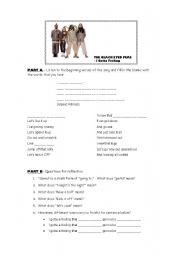
|
I gotta feeling that tonight´┐Żs gonna be a good night
Listen to the beginning of the song "I gotta feeling" by the Black Eyed Peas and fill in the blanks with the lyrics. Discover the meaning of a few of the idiomatic expressions in the song. Use the phrase "I gotta feeling that..." to make predictions.
Level: elementary
Age: 14-17
Type: worksheet
Downloads: 22
|
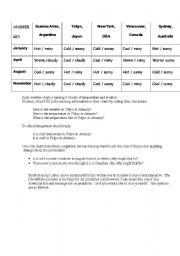
|
What is the weather like in Tokyo in spring? It is warm and rainy.
This is a class activity, but it can be a class, group or pair activity if adapted. Each student gets a different chart with the info on the weather in different places. Some information is missing and they must ask other students in the class for that information to complete the chart.
It is better if done with pictures in place of words bu...
Level: elementary
Age: 10-17
Type: activity-card
Downloads: 11
|
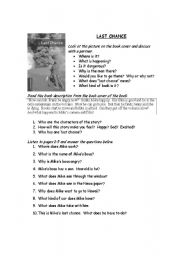
|
Last chance
This is an introductory activity to the book (oxford bookworm)last chance intended to help students into reading of the book themselves. It includes some conversation and listening activity for the first chapter of the book.
Level: elementary
Age: 11-17
Type: others
Downloads: 0
|
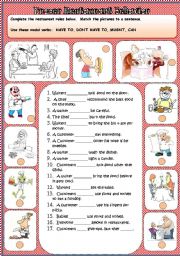
|
Modal Verbs for Restaurant Rules
Complete the sentence with an appropriate modal: HAVE TO, DONT HAVE TO, MUSTN´┐ŻT, CAN. Then match the pictures to one of the sentences.
Level: elementary
Age: 9-12
Type: worksheet
Downloads: 170
|
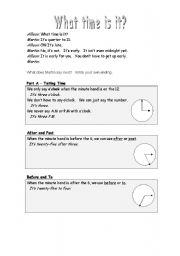
|
Telling time
telling time
Level: elementary
Age: 14-17
Type: worksheet
Downloads: 1
|
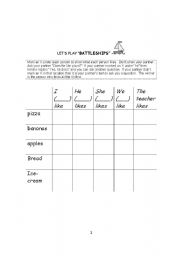
|
Does he like pizza? simple game of "Battleships"
Mark an X under each person to show what each person likes. Don´┐Żt show your partner. Ask your partner ´┐ŻDoes he like pizza?´┐Ż If your partner marked an X under ´┐Żhe´┐Ż then he/she replies ´┐ŻYes, he does´┐Ż and you can ask another question. If your partner didn´┐Żt mark an X in that location then it is your partner´┐Żs turn to ask you a question. The winne...
Level: elementary
Age: 8-17
Type: others
Downloads: 3
|
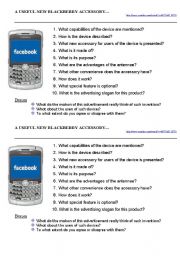
|
The Blackberry Helmet
A funny listening practice based on Rick Merer´┐Żs Blackberry helmet parody on the topic of addiction to our technology. You tube link is included.
Level: advanced
Age: 14-17
Type: others
Downloads: 40
|
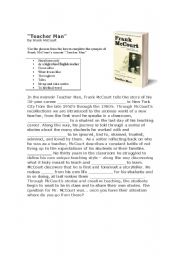
|
Introduction actiities to Penguin Reader: TEACHER MAN by Frank McCourt
These are some introductory in class activities to generate interest and encouragement in reading the Penguin graded reader: Teacher Man by Frank McCourt. The listening can be easily downloaded from the link provided in the worksheet. The listening focuses on an excerpt of Frank McCourt reading from his book where he talks about his rather humoro...
Level: intermediate
Age: 14-17
Type: others
Downloads: 11
|
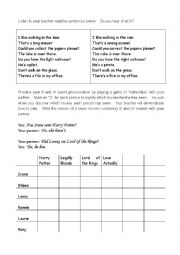
|
Pronunciation practice: L and R
This activity uses minimal pairs to show how L and R pronunciation affect meaning. There is an activity where students can practice their pronunciation is the form of a battleships game.
Level: intermediate
Age: 13-100
Type: activity-card
Downloads: 5
|
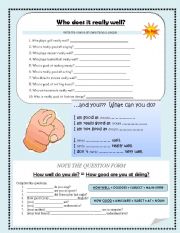
|
How good are you at...? How well do you...?
Question formation with auxiliary verbs BE and DO, grammar and speaking practice with HOW WELL and HOW GOOD AT
Level: elementary
Age: 11-17
Type: activity-card
Downloads: 9
|